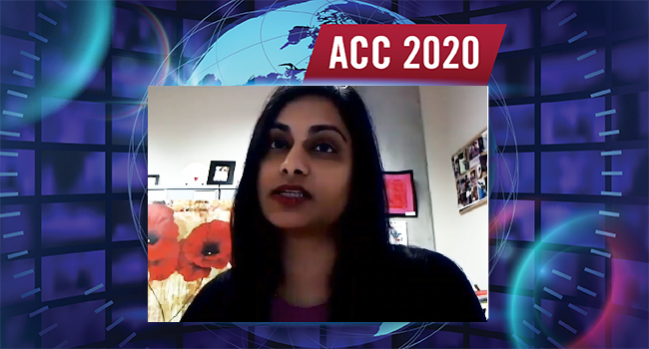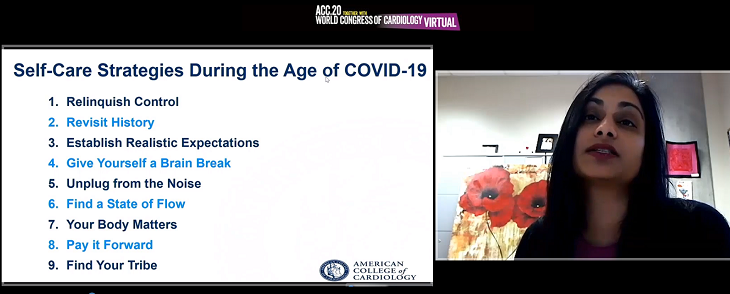More Burnout in Cardiology as COVID-19 Fans the Flames
Burnout numbers continue to rise and experts anticipate this will only increase given the current stressors. Laxmi Mehta has some tips.

Burnout continues to scorch the cardiology profession despite efforts in recent years to extinguish the blaze, according to new numbers from the American College of Cardiology (ACC) 2019 Well-being Study.
In this latest survey, which drew responses from 2025 cardiologists, including 362 women, more than one-third report current burnout and 44% say they’re “stressed but don’t feel burned out.”
Worryingly, the numbers of cardiologists reporting burnout has risen by 32% from the ACC’s last survey in 2015.
“That is concerning,” Laxmi Mehta, MD (Ohio State University, Columbus), said bluntly, during her presentation at the virtual ACC 2020 Scientific Session.
She also gave a nod to today’s number one source of anxiety. “Given the current COVID-19 pandemic, we are cognizant of the panic, fears, and high levels of stress among all healthcare workers,” Mehta observed. A range of resources are available to cardiologists on the ACC’s website
Mounting Stressors, Hectic Work
The latest well-being survey was sent to 14,325 cardiologists in 2019 and used the same ACC professional life survey that formed the basis of the 2015 check-in, but this time they added in novel questions relating to medical errors and desire to change jobs.
Compared with the ACC’s 2015 survey, the number of cardiologists reporting no burnout has declined from 23.7% to 20.7%, while the number reporting burnout has jumped from 26.8% to 35.4%.
Other key data include the following:
- Women report more burnout than men in cardiology: 45.3% vs 33.5%
- Midcareer cardiologists report the highest levels of burnout, at 45.3% compared with 35.4% for early career and 31.5% for late career
- Not surprisingly, burnout was highest among cardiologists working 60 or more hours per week (41.5% of whom reported burnout) and among those who reported a “hectic work environment” (59.5%)
In a sobering finding, 8.6% of responders admitted they’d made a major medical error, and this was most common among cardiologists reporting burnout (58.3%) and stress (33.1%). Among the 315 respondents who said they were planning to leave their practice setting, a full 58.1% reported burnout.
Four out of five burned out physicians who said they were planning to leave their current practice setting cited the desire to spend more time with family as a key reason. Work-related pressures including call, excessive RVU targets, electronic medical records, and pressure to maintain high patient satisfaction scores also were cited as factors for leaving.
To TCTMD, Mehta said there were a number of reasons why the burnout numbers appear to be rising. “People maybe recognizing symptoms more,” she said, or “may be feeling more comfortable admitting burnout,” although there is still a stigma around admitting burnout, she added in an email.
But even as cardiologists and working groups such as the ACC’s are recognizing burnout as a growing problem, Mehta said, “the administrative burdens have not lessened, and there is still pressure for excessive RVU targets and to maintain high patient satisfaction scores. Many institutes publicly report patient satisfaction scores on their websites; however, there is lack of data if high patient satisfaction scores correlated with improved quality of care.”
Mehta closed her talk with a slide reminding colleagues of self-care strategies during COVID-19.
Pipeline Concerns
Commenting on the new results, virtual panelist Sandra J. Lewis, MD (Legacy Emanuel Medical Center, Portland, OR), zeroed in on the groups with the highest rates of burnout—midcareer and female cardiologists. “It’s worrisome to me that this may be impacting our pipeline,” she said.
Mehta, in response, said that it’s an issue the ACC workgroup on wellness is tracking and focused on with the aim of increasing the underrepresentation of these groups. “We do need to recognize that some of the limitations that have been seen in the past have been referrals or recommendations [targeting these groups] to go into cardiology,” she said. “There are very successful and satisfied female cardiologists and underrepresented minorities that have paved the way for others and continue to shine the light that this is a field that we love, that is dear to our heart, and that we would encourage [others to go into].”
Lewis also mentioned the “elephant in the room today”—the fact that they are discussing burnout at a time when healthcare workers are on the frontlines of the COVID-19 epidemic facing stressors not even considered when the current survey was designed.
We need to remember some of steps that I have outlined, as well as just being there for each other and listening, and trying to elevate each other to get through this crisis. Laxmi Mehta
“It’s hard not to think of our colleagues who are working long hours in a work environment with lack of control, and more than that the lack of safety in their work situation, that we have worked so hard to achieve as we run out of protective wear and don’t have masks. And we see our colleagues falling victim to this. It’s going to be a challenge for you, Dr. Mehta, to help us through the burnout that we’re going to see at the end of this.”
Mehta replied that systemic issues have repeatedly emerged as a key source of burnout—electronic medical records and administrative tasks that have taken away the “fun” of patient interactions.
“But in these times, when we’re pushed to that brink, the resilience issues also play a factor and we need to remember some of steps that I have outlined, as well as just being there for each other and listening, and trying to elevate each other to get through this crisis,” she urged.
Shelley Wood was the Editor-in-Chief of TCTMD and the Editorial Director at the Cardiovascular Research Foundation (CRF) from October 2015…
Read Full BioSources
Mehta L. Practice factors affecting cardiologists' wellbeing: the American College Of Cardiology 2019 Well Being Study. Presented on: March 28, 2020. ACC 2020.
Disclosures
- Mehta reports having no disclosures.



GHANASHYAM KANE